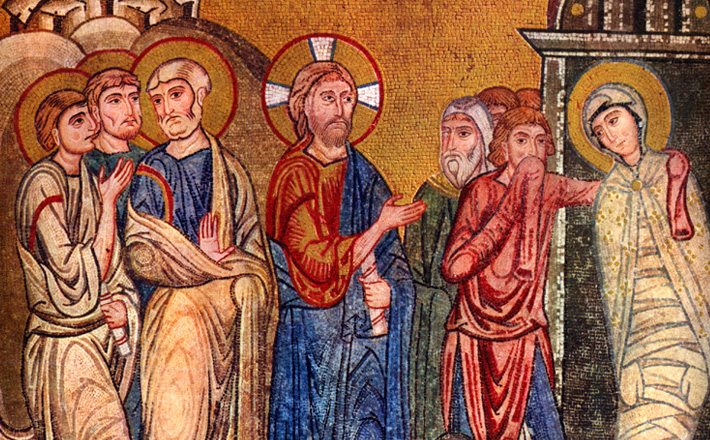Commentary on Ezekiel 37:1-14
Ezekiel’s vision of the dry bones coming to life is offered alongside the stories of death and life from John 11.
The passage also occurs at two other times: on Pentecost, and as part of the Easter Vigil. In each setting, a different dimension of Ezekiel 37 is foregrounded. Perhaps the story is best known from Pentecost, where the role of God’s spirit stands out most strikingly. The Hebrew word ruah, meaning “breath” and “wind” as well as “spirit,” is repeated ten times in these fourteen verses — four times in the climactic verse 9 alone:
Then he said to me, “Prophesy to the breath (ruah), prophesy, mortal, and say to the breath (ruah): Thus says the Lord GOD: Come from the four winds (ruah plural), O breath (ruah), and breathe upon these slain, that they may live” (Ezekiel 37:9).
But today the emphasis lies elsewhere, in the very question of death and life, offering listeners a gentle inoculation against the horrors to come in less than two weeks on Good Friday. Beside this story echo the pensive words of Psalm 130: “Out of the depths I cry to you … I wait for the Lord, my soul waits … more than those who watch for the morning.”
Ezekiel speaks from Babylon, exiled from a country that has died, its temple and capital city destroyed. Like earlier prophets, Ezekiel understands this disaster not simply as the unfortunate result of Babylon’s empire-building. To him, since nothing can happen unless God allows it, Judah’s people and especially their leaders brought this devastation upon themselves by their disobedience to God.
The prophet is understandably pessimistic about human goodness. He insists that individuals are utterly free to make moral choices and utterly responsible for the consequences of these choices. Each individual is given the chance to make decisions that may be life-giving or death-dealing (Ezekiel 18). Yet Ezekiel sees little evidence that Judeans will choose more wisely in the future than they have in the past. Though blessed with moral agency, they are no more able to use this faculty well than lifeless bones are able to get up and walk. This conundrum in Ezekiel’s theology could have led to an unspeakable impasse.
But Ezekiel discovers divine grace instead. This grace initiated the whole human enterprise by making humans from dust and breathing into them the breath, ruah, of life (Genesis 2:7). God likewise initiated the entire Israelite project, choosing to take slaves from Egypt, giving them God’s own law, and bringing them to a good land — and doing this with minimal cooperation (Ezekiel 20:5-14). Now, Ezekiel says, God will take the initiative yet again: God’s spirit will bring new life to a people dead as stone, dead as bones.
This vision of dry bones coming to life is closely related to a saying that has already appeared twice in the book. In Ezekiel 11, speaking for God, the prophet has already said of the exiles:
I will give them one heart, and put a new spirit within them; I will remove the heart of stone from their flesh and give them a heart of flesh, so that they may follow my statutes and keep my ordinances and obey them. Then they shall be my people, and I will be their God. (Ezekiel 11:19-20)
And again in Ezekiel 36:
A new heart I will give you, and a new spirit I will put within you; and I will remove from your body the heart of stone and give you a heart of flesh. I will put my spirit within you, and make you follow my statutes and be careful to observe my ordinances. Then you shall live in the land that I gave to your ancestors; and you shall be my people, and I will be your God. (Ezekiel 36:26-28)
This new heart is nothing the people can obtain for themselves. The new spirit is not their own, but God’s, a spirit enabling them to do what they could not before, to live as holy people before Holy God. The prophet spells out the divine intent in these two sayings, and in the story of the dry bones he shows it.
Divine initiative and human action are interwoven throughout this passage. It is God who leads Ezekiel to the valley and directs his attention and speech. It is the prophet who sees, and describes, the utterly dry bones, and responds by doing as he is asked, ordering the desiccated bones to hear God’s word. As he does so, with no help from the bones themselves (what could the dead do?), God brings them together.
God adds sinews, tendons to attach them; flesh, muscles to make them strong, and skin to give them form. Yet still they lie lifeless. It is only when God tells the prophet to speak to the ruah — the spirit, or breath — and Ezekiel does so, that the spirit breath blows from the four winds and the bodies live and stand. Divine agency and human response appear interwoven, if not inextricable. Initiative comes from God, who makes sure the prophet participates. Ezekiel calls to the spirit; the spirit enters the people; they come to life, a vast multitude.
Only grace fills the gap between what we are made for and what we ourselves can manage.


April 2, 2017